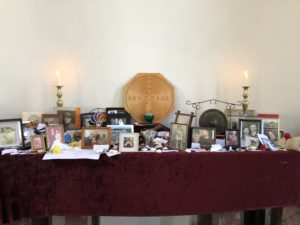There’s a joke I’ve always loved, but always have to look up to make sure I get it right. When I looked it up (again) this week I discovered that in a 2005 poll in the UK it had been voted the funniest religious joke:
I was walking across a bridge one day, and I saw a man standing on the edge, about to jump. I ran over and said:
“Stop. Don’t do it.”
“Why shouldn’t I?” he asked.
“Well, there’s so much to live for!”
“Like what?”
“Are you religious?”
He said: “Yes.”
I said: “Me too. Are you Christian or Buddhist?”
“Christian.”
“Me too. Are you Catholic or Protestant?”
“Protestant.”
“Me too. Are you Episcopalian or Baptist?”
“Baptist.”
“Wow. Me too. Are you Baptist Church of God or Baptist Church of the Lord?”
“Baptist Church of God.”
“Me too. Are you original Baptist Church of God, or are you Reformed Baptist Church of God?”
“Reformed Baptist Church of God.”
“Me too. Are you Reformed Baptist Church of God, Reformation of 1879, or Reformed Baptist Church of God, Reformation of 1915?”
He said: “Reformed Baptist Church of God, Reformation of 1915.”
I said: “Die, heretic scum,” and pushed him off.
There’s one thing everybody seems to be united on these days, and that’s the fact that we’re so divided. Whether we’re talking about the country, a local community, our families … it seems that everybody’s taking “sides:” Liberal and Conservative. Women and Men. Old and Young. Pro-Kavanaugh and Anti-Kavanaugh. Laurel and Yanni. (People who get that joke and people who don’t.)
It seems that we humans have always been tribal by nature, have always dichotomized “us” and “them.” After all, we humans are social animals by nature, and we’re decidedly ill-quipped for living in isolation – ill-equipped both physically and by temperament. We need one another. By living in groups, with others, our ancestors were able to share resources, and were better able to protect themselves from threats. And because we evolved in small groups, there was an adaptive advantage to being able to discern who is in you group and who isn’t. “Us” and “Them” isn’t a new phenomenon. At one point our survival depended on it, so much so that it’s as if it’s been encoded in our DNA.
And many people think that “religion” – writ large – is one of the most effective ways we humans have ever devised for perpetuating the perennial problem of partitioning the “saved” from the “damned.” Look at all the religious wars that have ever been fought – that are still being fought – and you can see all the proof, if proof you’re looking for, that “religion” is dangerously divisive. Some say that it’s really religion’s only purpose.
Last week I threw out my planned reflections because I couldn’t imagine not speaking to the blatant display of our culture’s misogyny that was taking place in those Senate hearings. Coincidentally (or not) for more than a month it had been my plan to reflect this morning on the roots of sexism and misogyny in the Judeo-Christian traditions that can arguably be said to be the foundation of Western culture(s). This week I read something that provides a clear bridge between these two explorations. In defending Kavanaugh, and, more to the point, attacking Dr. Ford, someone tweeted, “What did you expect? Women have been nothing but trouble for men ever since Eve gave that apple to Adam!”
There’s no question that the Jewish and Christian scriptures have been used in some grossly damaging ways. The apostle Paulwrote to the fledgling church in Corinth, for instance: “Women should remain silent in the churches. They are not allowed to speak, but must be in submission, as the law says.” That’s just one example of what the Biblical Scholar Dr. Phyllis Trible described as “texts of terror.” (Which is also the name of her important 1984 book.) To take another example, this time from the Gospels, there’s a story told in the Book of Matthew about a Canaanite woman who desperately pleaded with Jesus to heal her daughter. Jesus is recorded as saying, essentially, that he’d come to save the Jewish people and that he wouldn’t waste a healing on a non-Jew. (The text actually reads, “It is not right to take the children’s bread and throw it to the dogs.”)
And then, of course, you have Eve. Most people know at least the broad strokes of the myth. Adam and Eve were living in the literal, actual “Garden of Eden.” The character of God tells them that they can do anything they want, enjoy everything they see, but that the one thing they absolutely must not do is to eat any of the fruit from the tree in the center of the garden, the tree known as “The Tree of the Knowledge of Good and Evil.” Well, wouldn’t you know it, the Devil, in the form of a snake, convinces Eve (silly woman that she is) that it’s perfectly okay to eat that fruit, which, of course, she does. And then she tempts Adam, so that he also breaks God’s one and only limit. And for this, the two are unceremoniously evicted from the Garden, and we’ve been locked out ever since.
As if to overly reinforce Eve’s role in all of this – her responsibility for all of this – Biblical commentators have, over the centuries, said that Eve “tempted, beguiled, lured, corrupted, persuaded, […] urged, used wicked persuasion, led into wrongdoing, proved herself an enemy, used guile and cozening, tears and lamentations, to prevail upon Adam.” So, what do you expect? Women have been causing trouble for men ever since Eve gave Adam that apple!
It’s passages like these that have led many to argue – even many UUs to argue, even some UUs here to argue – that religion is irredeemable, since it is forged in, and reinforces, patriarchy (among other things). And it’s not just the Jewish and Christian traditions! Even Buddhism, in its sutras, describes the signs of a Buddha – hair in a certain pattern, skin of a certain color, a particular type of genitals. In other words, men only need apply.
I would argue that these are a perversion of religion’s truest, deepest message. I love verse 49 of the Holy Qur’an, which says, “O humankind! We have […] made you into nations and tribes, that ye may know each other (not that you may despise each other).” We’re different, yes, but we’re different in order to learn from one another. Built into the fabric of the Muslim faith – and I’d argue the fabric of every faith – there is this sense that we are, as I’ve put it, “one human family, on one fragile planet, in one miraculous universe, bound by love.”
Dr. Trible’s book Texts of Terror: Literary-Feminist Readings of Biblical Narratives is not just a litany of texts that have been used to oppress and subjugate, particularly, women. It’s also an offering of ways to reclaim what she believes, as do I and many others, the underlying message of unity and equality, the real, foundational message of faith.
In literary studies there’s something called “the hermeneutics of suspicion.” It says, essentially, to pay close attention to what a text doesn’t say. So that passage from Paul in which he tells women to sit down and be quiet? She’d say that it actually provides proof that in the early Christian church women were vocal leaders – why else would you need to tell them to sit? And Jesus’ interaction with the Canaanite woman in which he calls her a “dog”? It continues with the woman responding that even dogs eat the scraps that fall from the table. The story then says that Jesus stopped in his tracks, praised her faith (and, no doubt, determination and powerful sense of self) as being greater than any he had seen among his own people, and heals her daughter. Actually, he says that her faith healed her daughter. The story can be read not as one of a man disparaging a woman (although that’s certainly in there). The story really is about a strong woman changing Jesus’ awareness and the course of his teachings, because the author of Matthew records that from that time forward Jesus never again talks about his mission as being to one group only, but, rather, to the whole world. Tribalism was replaced by a recognition of our common humanity.
What Eve? That story can be read as showing women to be God’s ultimate creation, since she was created after Adam, just as he was created after the animals and was describes as superior to them. Additionally, the text says nothing about Eve “tempting” Adam. Instead, it says simply that “she gave some to her husband and he ate.” Some say that like most parents, God knew that the prohibition against eating the fruit of that tree was the best way to guarantee that they would do so; that it was actually part of the plan, because “the knowledge of good and evil” is part of what makes us human. We have the ability to discern right action from behaviors that hurt and harm, and with that knowledge we can consciously choose which to do.
There’s one thing everybody seems to be united on these days, and that’s the fact that we’re so divided. And while that may have been an evolutionary benefit in the early days of our specie’s development, it is a danger to us today. We are fundamentally social animals, and if we evolved in small groups, today we absolutely must recognize that we live on a very small planet, and that continuing to divide humanity into “us” and “them” will not keep us safe, it will guarantee our demise.
What will save us? What the story I read earlier was all about – kindness. One of our hymns has the line, “kindness can heal us,” and it may, in truth, be the only thing that can – whether on the interpersonal level or the level of nations. “Each little thing we do goes out, like a ripple, into the world.” Ms. Albert said to her class. “Each kindness […] makes the whole world a little bit better.”
Divisiveness may be encoded in our DNA, but thanks to the mythical Eve we can choose to continue to follow patterns that no longer serve to keep us safe and to, instead, embrace our common humanity. We must learn that we are all of the same tribe. And we must learn to be kind to one another.
Pax tecum,
RevWik












